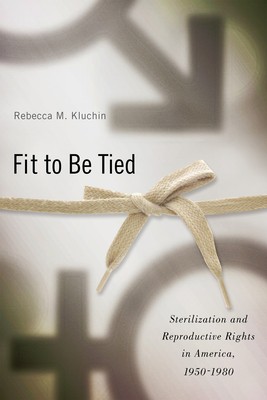
- We will send in 10–14 business days.
- Author: Rebecca M Kluchin
- Publisher: Rutgers University Press
- ISBN-10: 081354999X
- ISBN-13: 9780813549996
- Format: 15 x 22.9 x 2 cm, softcover
- Language: English
- SAVE -10% with code: EXTRA
Reviews
Description
The 1960s revolutionized American contraceptive practice. Diaphragms, jellies, and condoms with high failure rates gave way to newer choices of the Pill, IUD, and sterilization. Fit to Be Tied provides a history of sterilization and what would prove to become, at once, socially divisive and a popular form of birth control.
During the first half of the twentieth century, sterilization (tubal ligation and vasectomy) was a tool of eugenics. Individuals who endorsed crude notions of biological determinism sought to control the reproductive decisions of women they considered unfit by nature of race or class, and used surgery to do so. Incorporating first-person narratives, court cases, and official records, Rebecca M. Kluchin examines the evolution of forced sterilization of poor women, especially women of color, in the second half of the century and contrasts it with demands for contraceptive sterilization made by white women and men. She chronicles public acceptance during an era of reproductive and sexual freedom, and the subsequent replacement of the eugenics movement with neo-eugenic standards that continued to influence American medical practice, family planning, public policy, and popular sentiment.
EXTRA 10 % discount with code: EXTRA
The promotion ends in 17d.14:15:49
The discount code is valid when purchasing from 10 €. Discounts do not stack.
- Author: Rebecca M Kluchin
- Publisher: Rutgers University Press
- ISBN-10: 081354999X
- ISBN-13: 9780813549996
- Format: 15 x 22.9 x 2 cm, softcover
- Language: English English
The 1960s revolutionized American contraceptive practice. Diaphragms, jellies, and condoms with high failure rates gave way to newer choices of the Pill, IUD, and sterilization. Fit to Be Tied provides a history of sterilization and what would prove to become, at once, socially divisive and a popular form of birth control.
During the first half of the twentieth century, sterilization (tubal ligation and vasectomy) was a tool of eugenics. Individuals who endorsed crude notions of biological determinism sought to control the reproductive decisions of women they considered unfit by nature of race or class, and used surgery to do so. Incorporating first-person narratives, court cases, and official records, Rebecca M. Kluchin examines the evolution of forced sterilization of poor women, especially women of color, in the second half of the century and contrasts it with demands for contraceptive sterilization made by white women and men. She chronicles public acceptance during an era of reproductive and sexual freedom, and the subsequent replacement of the eugenics movement with neo-eugenic standards that continued to influence American medical practice, family planning, public policy, and popular sentiment.


Reviews